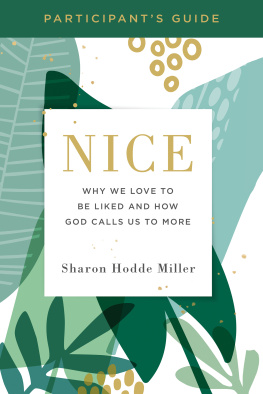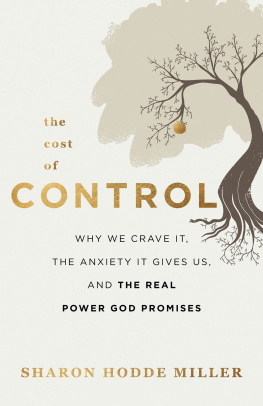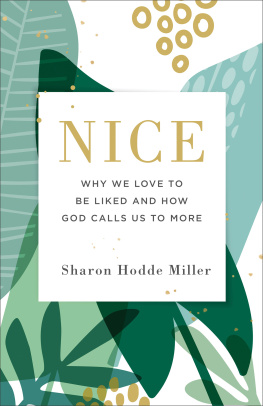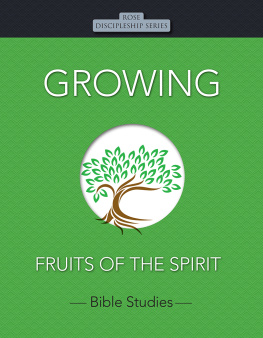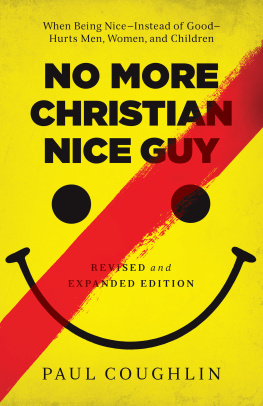Introduction
Why are you driving so SLOW!? I growled at the sluggish car ahead of me. I was already running late to church because I couldnt find one of my childrens shoes, and now this driver and every red light seemed to be conspiring against me. My blood pressure was rising higher and higher, and I didnt realize how loud my complaint had been until a tiny voice from the back chimed in,
Mommy, why are you so mad?
It was a classic case of road rage, and many of us have moments like it. Maybe they are your response to the unrelenting behavior of your kids. Or the rant you posted on social media or the rude comment you made to your spouse. It feels cathartic in the moment, but sometimes it leaves us with regret. Maybe I should have been a little bit more nice .
Im Sharon Hodde Miller, and Im so excited to join you in this study of Nice . Im a wife, mom, writer, and more recently, a church planter with my husband, Ike. As a long-time Christ follower, I feel like Ive always loved God and the church. But Ive noticed something going on in my heart, and in the church, for a while now.
In my first book, Free of Me , I describe myself as a nice Christian girl, and to be honest, it wasnt until recently that I started to see that as problematic.
Niceness . What is this niceness all about? Could it perhaps be adding pressure to behave in a certain curated way? Could my little blips of road rage, for instance, be due to that pressure bubbling over? If my quiet, private car is a place where I can comfortably speak unkindly to nearby drivers, perhaps my niceness isnt as fundamental to who I am, or to being a witness to Gods love, as I assumed it was. Perhaps its even causing me to lose sight of the path Jesus wants me to follow.
The truth is that God never called us to be nice. Yet we live in a culture that prizes niceness as one of its highest virtues. Niceness keeps the peace, wins friends, gains influence, and serves our reputations well, but it also takes the teeth out of our witness and the power out of our faith. When we choose to be nice instead of faithful, we bear fruits that are fake, bland, bitter, hard, and rotten to the core. The church is less healthy when all we want is a nice exterior.
The Bible does, however, call us to kindness, gentleness, and love. These fruits of the Spirit come from a healthy tree if you will. And as Jesus says, we will know a tree by its fruit.
In this five-session series, we will draw on this tree-and-fruit metaphor to explore the seemingly innocent idol that has crept into our faith and quietly corrupted it, producing several bad fruits. Then well challenge each other to cultivate a better tree, taking practical steps to reclaim our credibility as followers of Christ and bear better, richer, more life-giving fruits.
How to Read the Book as You Watch the Videos
If you are reading Nice while you view the videos, please know that they loosely correspond with the following chapters:
Session 1: Chapters 1 through 7
Session 2: Chapters 8 and 9
Session 3: Chapter 10
Session 4: Chapter 11
Session 5: Chapters 12 and 13
The videos do not cover every chapter, which is why you may want to begin by reading the first half of the book, and then pick up the video series when you arrive at chapter 8. No matter the order you choose, it is my prayer that this study will inspire deep conversation and transformative life change as you journey through it!
Lord Jesus, in our pursuit to love like you love, to show the world how wonderful and full of grace you are, we have become a nice peopleafraid, inauthentic, and shallow. We pray that through this study, you will show us the bad fruits that come from niceness and reveal how we can be your true disciples in a modern world. Lights that shine in the darkness, no matter how intimidating it can be. Amen.
Session 1
The Fruit of Niceness
The temptation of the age is to look good without being good.
Brennan Manning
Niceness is a form of cultural currency. For instance, we are expected to smile at cashiers or speak pleasantries on the phone in order to get all manner of thingsfrom a smooth transaction at the store to a promotion at work. Niceness is a way to get what we want, in small and big ways. Of course, theres nothing wrong with smiling at people (our world could use more civility), but what I am going to address in this series is the ways niceness has evolved beyond social politeness into a transactional crutch.
For many of us, we also use niceness as a way to draw others to Jesus. We think that simply putting a smile on our face will help people see Jesus in us. But is niceness the key to witnessing to Christs kingdom?
Not when we look at the life of Jesus. Jesus was straightforward and honest, sometimes sad and afraid, sometimes angry, sometimes playful, but he was never simply nice. And this begs an important question. If niceness was never Jesuss public default, why is it ours?
Before watching video 1, read the introduction and chapters 1 through 7 in Nice .
1. Did you relate to the story of Sierra or her coworker? Both? Neither?
2. In the first seven chapters of the book, is there anything you read about niceness that you hadnt thought about before?
3. Looking at your own life, in what ways have you used niceness to get things or to have things go your way? Have you used niceness in an attempt to lead people to Jesus? How so?
4. In what ways have you seen niceness take the form of a false virtue in the world? And in what ways have you seen niceness take the form of a false idol in the church?
5. Whats the difference between kindness and niceness? Consider Jesuss example. In what ways did Jesus demonstrate this distinction?
6. Consider the Christmas tree example. What does it illustrate about the cost of staying in the nice zone rather than encouraging authenticity?
7. Your spiritual health, or fruit, matters to those around you. What does it look like to show others who you are and whom you follow?

